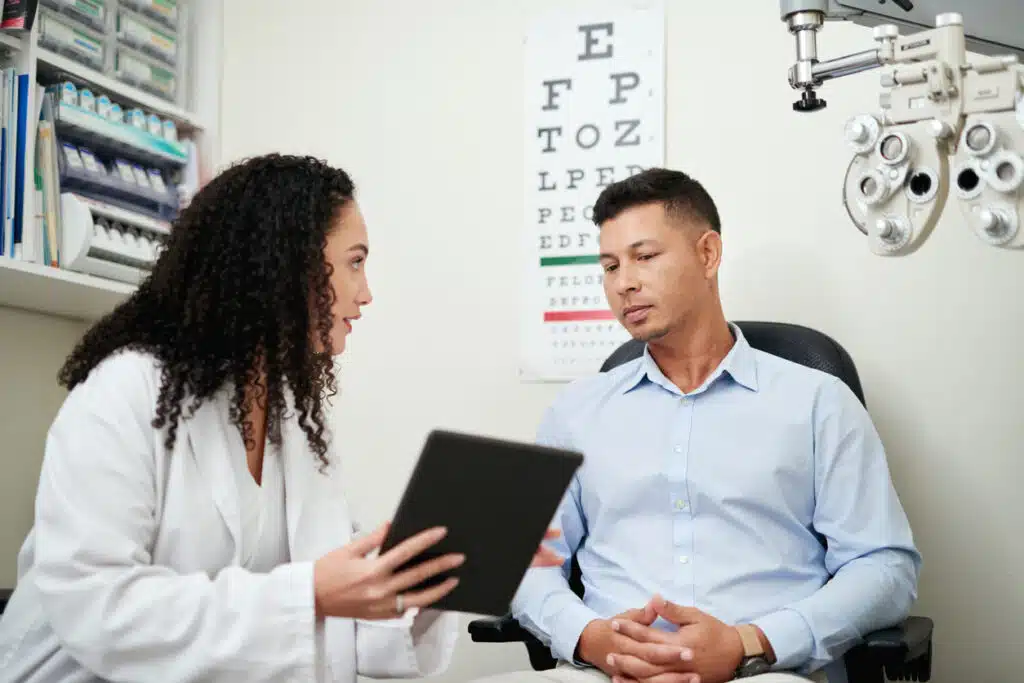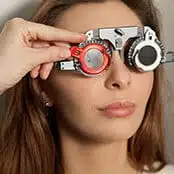
Eye exams are not just for people who have trouble seeing, but everyone between the age of 18 years to 64 years is recommended an annual eye exam by the American Optometric Association (AOA).
Regular visits to an ophthalmologist for routine eye exams are very important. This helpsto find vision problems and serious eye conditions early on, which can greatly affect how well you live your life later.In addition to eye exams, people visit an ophthalmologist to get a diagnosis and treatment of their vision and eye-related health problems.
Needless to say, for good eye health, it’s essential to see an ophthalmologist who is an expert in providing excellent eye care.
Here are some tips for finding a good ophthalmologist and how you can prepare for a visit to a good ophthalmologist in Washington, MO.
Tips to Find a Good Ophthalmologist
Here are some tips for finding a good ophthalmologist:
- Ask trusted people for referrals and recommendations.
- Research the experience and credentials of eye doctor
- Read patient reviews about the ophthalmologist.
- Consider accessibility and convenience.
- Ask about telehealth capabilities.
- Check your insurance coverage.
- Make an appointment.
Tips to prepare for a visit to a good ophthalmologist are as follows:
Tip #1 Document Your Symptoms
Before visiting your ophthalmologist, be aware of any symptoms or concerns you may have regarding your eyes and vision. Document all your concerns and symptoms, such as eye discomfort, night blindness, blurred vision, redness, or irritation in your eyes, to name a few.
Keeping a record of your symptoms will assist in recalling all of your concerns and symptoms when you visit the ophthalmologist.
Tip #2 Bring Your Current Medications
If you are using any medications for eye or vision issues, such as eye drops or eye ointments, or oral medications, make sure to bring them with you when you visit your ophthalmologist. Also, remember to bring any medications you are currently taking for conditions other than eye-related problems.
Tip #3 Know your Medical History
It is best to know and document your medical history, such as medical conditions or surgical procedures you have had. Bringing a record of your medical history can assist your ophthalmologist in understanding your medical history and providing appropriate care regarding your eye.
Tip #4 Note Down your Questions
You’ll likely forget your questions at the time of your visit to an ophthalmologist. So, it is best to note down any questions you have in your mind before you visit an ophthalmologist.
Tip #5 Bring Your Glasses or Contact Lenses
When you visit an ophthalmologist for an eye exam, bring your glasses or prescription lenses that you are using. This allows your ophthalmologist to thoroughly examine them and make any needed adjustments to ensure optimal vision correction.
Tip #6 Try to Bring Your Family Member or Friend with You
Try to bring one of your family members or friends with you at the time of your visit to an ophthalmologist, especially when you are facing any eye condition such as blurry vision or feeling nervous.
Bringing along a family member or friend to your appointment can offer moral support and help you remember any questions or concerns you might fail to recall during the visit.
Tip #7 Be Prepared for Your Eye Exam
If you are visiting an ophthalmologist for an eye exam, come prepared. During an eye exam, your ophthalmologist may dilate your eye’s pupil with some eye drops and may ask you to read some alphabets from a chart for vision testing.Additionally, your eye doctor may perform other eye tests like sit-lamp test, Automatic refraction, visual field, etc.
So, come prepared for your eye exams to make your eye exam easy and comfortable.
Good Ophthalmologist in Washington, MO
If you are seeking a good ophthalmologist for your eye problems or eye care, visit us at Advanced Sight Center, where we have board-certified ophthalmologists who provide a wide variety of eye-related services to improve and maintain your eye health.
In addition to providing the best eye care for you, our ophthalmologist also provides the patients with the best treatments regarding eye conditions such as glaucoma, cataracts, corneal disorders, and diabetic retinopathy, to name a few.
To make an appointment with one of our ophthalmologists, feel free to call us at (636) 239-1650 or fill out our online appointment request form.



